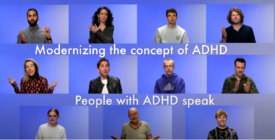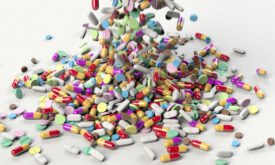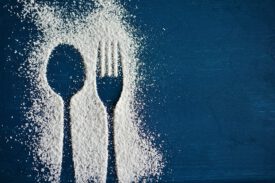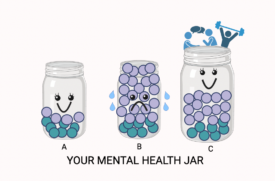
On: 5 February 2024
The amazing dance between your brain and your gut
Have you ever had a “gut feeling” or noticed butterflies in your stomach? These sensations can be explained by a fascinating network called the brain-gut-microbiome axis. Imagine a well-choreographed performance affecting not only your digestion, but potentially your mood and overall well-being. Let’s sneak behind the scenes of our ‘second brain’ to reveal the secrets of this complex interaction. The connection When we think about our gut, we think about the machine responsible for breaking down food and taking the nutrients where they should be. Recent studies have revealed that the gut is constantly communicating with the brain in a...
Modernizing the concept of ADHD
What is ADHD? For a long time, researchers and clinicians have been discussing this question amongst each other. So it is due time to involve the people who have ADHD in this discussion. How do they experience ADHD? What are their struggles? How do they benefit from having ADHD? Our mission is to actively involve the vision and experiences of individuals with ADHD in ADHD research and clinical developments. For the 9th World Congress on ADHD – with the theme “Modernizing the Concept of ADHD” – we created a film in which people with ADHD talk about their vision and...
Is paracetamol use during pregnancy a risk factor for autism or ADHD?
A frequent drug Most women experience headache, flu or even infections while they are pregnant. In this special period of their lives they care a lot about their own health but also (and usually a lot more!) about their baby’s health. Pregnant women reconsider what they eat, what they drink and their habits in order to provide the best environment for their future babies. In this regard, most health professionals rely on paracetamol as one of the few safe drugs to use during pregnancy. Indeed, despite pregnant women being reluctant to use drugs, paracetamol (or acetaminophen) is used by 46–56%...
What have we learned from 5 years Eat2beNICE?
From 18-20 January the final general assembly of the Eat2beNice consortium took place. During this meeting, we made plans for the future, reviewed where we currently stand, and looked back at how far we have come. Where we are All work packages presented the results from their studies. We saw for example the results from TRACE-study that show us how important eating healthy is for children with ADHD. The findings indicate that a healthy diet might lead to less medication use and a performance at least equal to the care as usual group. Similar findings come from the epidemiological studies,...
How to celebrate a gut-friendly Christmas
It is almost the end of December and Christmas is just around the corner. The holiday season is full of family gatherings with lots of food and drinks. How does this impact your health? In this blog I will discuss the effects of the “holiday diet” and the effect of visiting your in-laws during Christmas on your gut health. Additionally, I will give tips on how to celebrate a gut-friendly Christmas. Unhealthy food can harm your gut health Our diet affects the gut microbiome: the microbes that live in our intestines. These microbes grow on the food we supply to...
Do you eat more, less or the same when feeling stressed?
Even though many of us associate stress with eating more (i.e. overeating), research has shown that we differ in the dietary response to stress1: Some of us eat more, some eat less, while others show no change. Predicting who falls into which group is, however, very difficult, and research findings have been inconclusive. In our recent study, we found that situational factors might play a bigger role than stable individual factors, such as age, gender and BMI, in determining how stress changes our eating behaviour. Who of us eats more when feeling stressed? Knowing who is at risk for stress-induced...
Did you know that Alcohol Abuse could Damage Intestinal Microbiota?
The detrimental effects of alcohol on health are widely known. Alcohol abuse is linked to several inflammatory pathologies, such as liver, intestinal and mental diseases (1). When we consume alcohol, there is minimal absorption of alcohol in the mouth and oesophagus, approximately 20% of the alcohol consumed is gradually absorbed in the stomach, and 70% of the alcohol absorbed in the small intestine (2). Because our gut comes into direct contact with the alcohol we ingest, it is in the alcohol-gut interaction that many of the pathologies associated with alcohol consumption originate; and it is here that our gut microbiota...
What Genetics Can Teach Us About Mental Health
Is mental illness caused by our genes, our lifestyle, or both? What role do genes play in psychiatric disorders such as depression and attention-deficit/hyperactivity disorder (ADHD)? Research into the genetics of psychiatric disorders could provide us with the answer.But why would we care? Well, such discoveries can increase our understanding of the role our genes play in mental health and the biology behind these disorders. This can further help us improve the effectiveness of treatment and develop better diagnostics. Role of Genetics in Psychiatry Our genes can be seen as a recipe in a cookbook. Our genetic makeup contains information...
Why is it so difficult to change health-related behavior?
When you read the blogs on this website, you will know how healthy lifestyle and nutrition can contribute to mental health. With this information it should be easy for everyone to eat healthy, stop smoking and increase their physical activity, shouldn’t it? In reality, it is very difficult to adopt a healthy lifestyle, even when you know all the facts. Why it is so difficult to change our habits? Unlike what many people think, common sense or the right information about good health related behavior is not always enough for changing bad habits. It is more complex than that. Our...
Vitamin D and Students´ Mental Health
The exam season is almost upon us. Days in the library are getting longer and the urge to just go for some comfort food in the evening is growing. Unfortunately, this also means that our vitamin D levels are at a risk of falling. This can have a negative impact on our mood and overall mental health, which is exactly what we do not want during the busy weeks surrounding our exams. WHAT IS VITAMIN D? Truth is, Vitamin D is not actually a vitamin, but a hormone that takes care of the uptake of calcium and phosphate in our...








